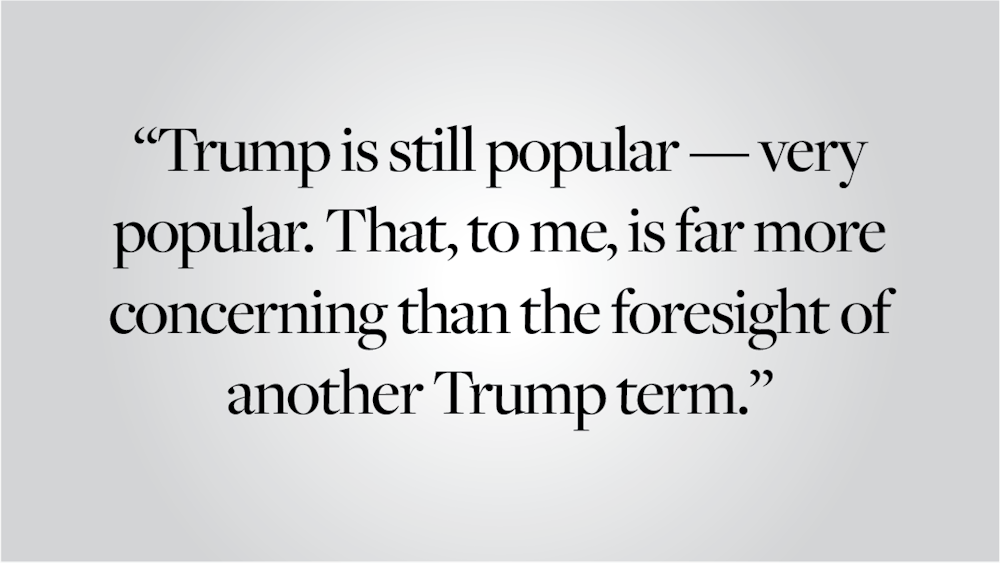On Feb. 8, the U.S. Supreme Court will hear Donald Trump’s appeal of the Colorado Supreme Court’s decision to bar Trump from being on the Colorado primary ballot. The country’s highest court will be dipping its toes into the dangerous waters of American electoral politics. In the wake of unprecedented American political division, we must consider what we achieve by forcing Trump off the ballot, given the overwhelming size of his constituency. We cannot ignore the seemingly larger threat at play: not the threat of Trump being president, but the threat of Trumpism at large.
The Colorado Supreme Court used Section 3 of the 14th Amendment to justify barring Trump from the state’s primary ballot. The section restricts those who have taken an oath from being “elector of President” if they “shall have engaged in insurrection or rebellion against the same, or given aid or comfort to the enemies thereof.” The amendment was ratified after the Civil War to keep Confederate officials out of government. While the legal argument for taking Trump off the ballot is clear, we must consider the broader consequences of this effort.
It is no secret that a large part of the country continues to favor Trump. Despite the volatility Trump has brought to American politics over the past eight years, 42.9% of Americans now have a “favorable” view of him. Within the GOP, he swept the Iowa caucus and beat Nikki Haley by 11% in the New Hampshire Primary.
Trump is still popular — very popular. That is far more concerning than the foresight of another Trump term.
If we simply take Trump off the ballot, we’d be ignoring the reality of his large constituency. This would further alienate Trump’s base and strengthen its resolve to support another arbiter of chaos who’s eligible to run for president. If we want to seek political restoration, we must address the deeper roots of our divide and reinstate trust in our country’s institutions while Trump is still in the playing field — as difficult as that might sound. Even if we solve our Trump issue, we’ll still have our political issue. And forcefully removing Trump from the ballot will only invigorate our political issue. We must put in the time and energy and work from the voter up.
Some might argue that removing Trump from the ballot and taking away his bully pulpit might help to subdue his incendiary lies and heal the underlying disillusionment that has led to his persistence. While these arguments certainly have merit, they dangerously negate the magnitude of Trump's influence, regardless of whether he is in or out of office. Intellectuals like Bruce Ackerman think barring Trump from the presidency could be restorative for the country and “reinvigorate the democratic energies of the American people.” While I am eager to jump on board with this sentiment, I can’t help but worry about the direction of Trump’s angry base, their next candidate and the social rift that this SCOTUS decision might deepen. Over the past three years, we’ve seen the extent of Trump’s influence even when out of office, as he’s continued to spew misinformation. With this, I am not easily convinced that restricting Trump from the presidency will simply make Trumpism go away.
This combination of a divided America and a Trump that just won’t quit makes it likely that the MAGA camp will rally behind a candidate similar to Trump in future elections, like Vivek Ramaswamy. This makes forcing Trump out of the election a band-aid solution used to treat a systemic injury.
I write this with no happy conclusion and no likely alternative. Instead, a note of warning: There may be no easy way out of our political tumult, and removing Trump from the ballot won’t solve our country’s deeper issue of Trumpism.
Paul Hudes ’27 can be reached at paul_hudes@brown.edu. Please send responses to this opinion to letters@browndailyherald.com and other op-eds to opinions@browndailyherald.com.
Paul Hudes is the senior editor of opinions of The Herald's 136th Editorial Board. He previously served as an opinions editor and the head of the Editorial Page Board. He is from Baltimore, MD and studies applied mathematics and international and public affairs. Paul writes the mini crossword for The Herald four times a week.





